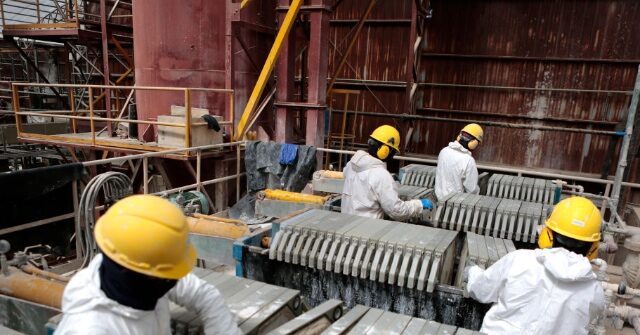Bolivia is home to some of the world’s largest lithium reserves, an indispensable material for the manufacture of batteries for electric vehicles and a wide range of devices such as smartphones and laptop computers. According to the U.S. Geological Survey, Bolivia boasts 23 million tons of lithium. The country, however, has almost no industrial production or commercially viable reserves of lithium.
In late June 2023, socialist President Luis Arce signed deals with China’s state-owned Citic Guoan and Uranium One Group, a subsidiary of Russia’s Rosatom, totaling $1.4 billion to have both companies work with Bolivia’s state-owned Bolivian Lithium Deposits (YLB) company on the construction of two lithium carbonate processing plants. Arce had Bolivia sign a separate deal that month with the Chinese battery company CATL to build two other lithium plants in the country for a total of four Chinese or Russian-built plants.
El Deber reported that it had reviewed YLB’s contracts with Hong Kong CBC Investment Limited, a CATL subsidiary, and Russia’s Uranium One group – which, the newspaper pointed out, were approved “in a surprise move” by the Bolivian Chamber of Deputies.
According to the contracts reviewed by the newspaper, Bolivia must pay the Chinese and Russian companies more than $2 billion — in addition to interest rates, “compensation for inflation,” and “payment for patents” — for the development of the lithium plants. The deal also provides both companies with “preferential treatment” in the commercialization of lithium carbonate produced by the Bolivian state.
El Deber stated in its report that Bolivia’s YLB state company justified the terms of the agreements on the grounds that the amounts must be paid so that the yet-to-be built plants remain in Bolivian state hands.
Lawmakers, specialists, and civic entities in Bolivia have all rejected the controversial deals, the newspaper asserted, questioning the interest rates that Bolivia must pay to Chinese and Russian state companies in addition to the preferential lithium commercialization clauses. Critics of the agreement have also questioned its profitability, given that “revenues are projected at a price of $30,000 per ton, when the price of this product is $10,000 in the global market.”
Bolivian Congressman Guillermo Benavídez told El Deber that the contract signed with the CATL subsidiary violates national legislation and represents a “bad deal” for Bolivia. The Congressman pointed out the “lack of state control and technological transfer” as evidence of the deal incurring damages to the country. Benavídez asserted that the financial burden of the contract for the payment of capital expenditures is “extremely high,” with an interest rate of 12 percent and an inflation compensation rate of 2.5 percent, a situation that, the lawmaker stressed, “puts operating costs at risk.”
“Neither production costs nor cash flow are defined, making it impossible to calculate the company’s returns,” Benavídez told El Deber.
Ricardo Alba Balderrama – founder of the Geneva Club, a Swiss-based non-government organization of Bolivian entrepreneurs – reportedly reviewed the contract signed between Bolivia’s YLB and Russia’s Uranium One Group. Alba Balderrama explained to the newspaper that, in exchange for a $1 billion investment, the agreement grants the Russian company control over the area with the highest concentration of lithium in Bolivia’s Uyuni Salt Flat region for an extendable period of 22 years.
Alba Balderrama asserted that, upon construction of the lithium plant, the Russian company is expected to recover its investment through “additional operation, maintenance and marketing contracts” which, he stressed, leaves Bolivia in a “low profit” position, merely paying a “surplus” that barely covers state costs. Alba Balderrama questioned the legality of the deal, which he denounced as violating constitutional regulations that require the Bolivian state to have control and direction of natural resources.
“With international lithium prices likely to fall short of the levels needed for profitable production — estimated to require prices in excess of $20,000 per ton and production of more than 100,000 tons per year — the current contract is not shaping up to be the economic ‘salvation’ that many are hoping for,” Alba Balderrama said.
Several civil society organizations from the southern city of Potosí and in the capital city of La Paz took to the streets on Monday to protest against the lithium deals that the Bolivian government signed with China and Russia. Protesters in Potosí reportedly marched with photos of eight Bolivian lawmakers that they denounced as “traitors to the country” for approving the lithium plant contracts between Bolivia and both countries.
The protesters denounced that the contracts were signed “behind the people’s back” and condemned the lack of transparency and discussions with the local population in the process. The protesters also accused both Chinese and Russian companies of not having “sufficient capital” to cover the operating costs.
“A president of a state who gives away resources behind the backs of his people is a traitor, and those who join as deputies in approving this type of contract are also traitors,” a statement from the Potosinista Civic Committee reportedly read.
Christian K. Caruzo is a Venezuelan writer and documents life under socialism. You can follow him on Twitter here.
Breitbart News
Read the full article .


